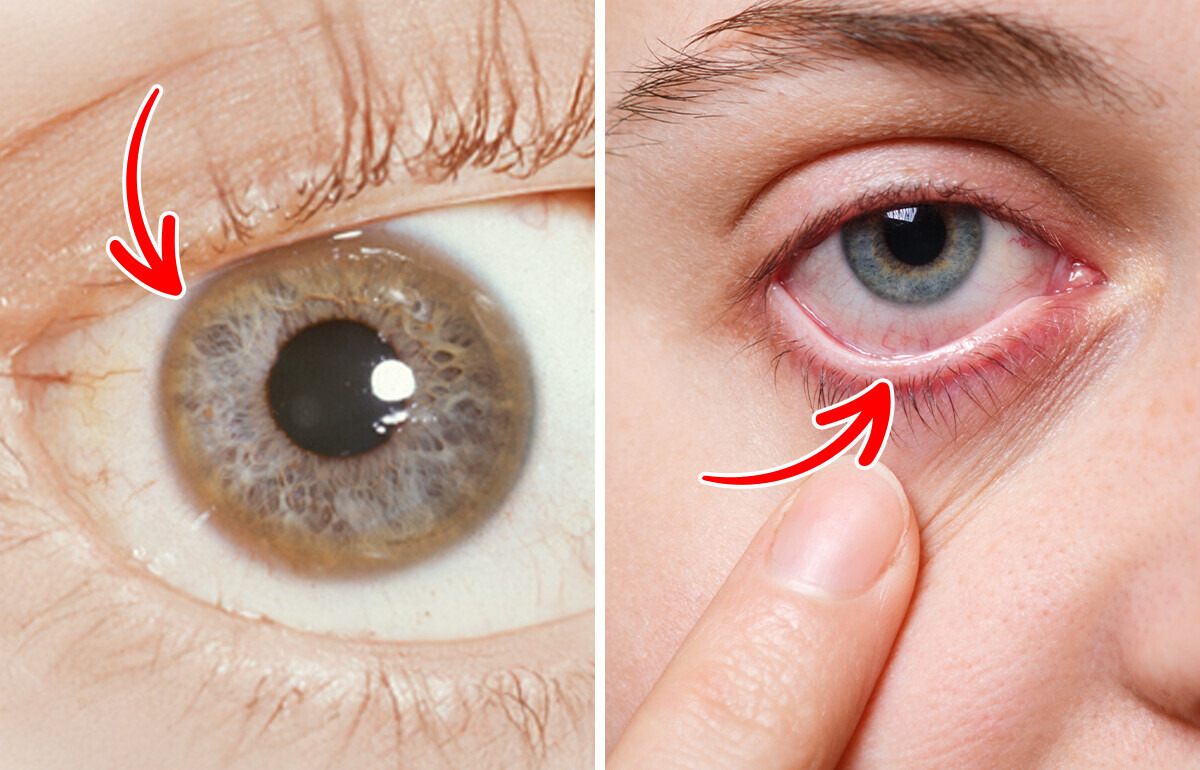Heidi Klum Shared Videos of Her Son’s Graduation and People Focused on One Detail


They say the eyes are the mirror of the soul... but it turns out they are also the mirror of your body! Sometimes, before you start sneezing, coughing, or feeling sick, your eyes are raising their hand to warn you that something is wrong. Blurred vision? Yellow eyes? A nervous twitch that only happens when you have to speak in public? Beyond fatigue or everyday drama, these symptoms could be saying, “Watch out! There’s something bigger going on here.”
In this article, we’ll explore 12 signs your eyes may be sending you about your overall health that you definitely shouldn’t ignore. Spoiler alert! Some have to do with chronic disease, some have to do with your lifestyle (hello, modern-day stress), and some could be the clue you’re missing to spot a problem before it becomes more serious.
Content is provided for informational purposes only and is not intended as a substitute for medical advice. Seek guidance from your doctor regarding your health and medical conditions.
Have you ever had the sudden sensation of seeing as if you were underwater? Sometimes it’s fatigue, but if blurred vision comes on suddenly and doesn’t go away, it could be a warning sign of something more serious.
It could indicate diabetes, high blood pressure, or even a transient cerebrovascular accident (mini stroke). For example, diabetes can damage the blood vessels in the retina (diabetic retinopathy), which can affect vision. If this symptom lasts more than 24 hours, it is time to see a specialist.
When the whites of your eyes (sclera) turn yellow, your liver is probably calling for help. This is usually due to jaundice, which occurs when bilirubin builds up in the blood. It can be a symptom of hepatitis, cirrhosis, or gallbladder problems. If you notice this change in your eyes, don’t ignore it.
That twitch in your eye that happens just when you have a thousand things on your plate... yes, it can be stress, but it can also be lack of sleep, excessive caffeine, or magnesium deficiency. It usually goes away on its own, but if it persists for weeks, it could be a sign of a neurological disorder such as multiple sclerosis.
If you feel like you have dust in your eyes all day, it may be more than just a nuisance. Dry eye syndrome occurs when we don’t produce enough tears and can be linked to autoimmune diseases such as Sjögren’s syndrome. In addition, overuse of digital screens causes us to blink less, which can make dryness worse.
Have you noticed that you have trouble seeing from the side and didn’t realize it until someone pointed it out to you? This could be an early symptom of glaucoma, a silent disease that damages the optic nerve. Because it progresses without obvious symptoms, many people discover it when irreversible damage has already occurred. Fortunately, an eye exam can detect it early.
Those little spots or dots that seem to move when you try to focus on them are called myodesopsias, and they are usually harmless when they appear a little at a time.
BUT... if you suddenly see many more than usual, or if they are accompanied by flashes of lightning, they may be a sign of something serious: retinal detachment. This is an urgent problem: the retina (which is like the screen where we “see” images) detaches from its place, and if it is not treated immediately, you can lose vision in that eye. So if you’d better see an ophthalmologist.
Do your eyes seem more bulging or prominent than normal, as if you are always being surprised? This appearance may be a classic symptom of Graves’ disease, a type of autoimmune hyperthyroidism. In this disease, the immune system mistakenly attacks the tissues behind the eye, pushing them outward.
In addition to the physical change, you may experience eye pressure, double vision, dry eyes, or difficulty closing your eyes completely while sleeping. It’s not just a cosmetic problem: If left untreated, it can seriously affect your vision. This condition is more common in women between the ages of 30 and 50, and is often accompanied by weight loss, nervousness, and insomnia.
If you look in the mirror and notice a brown, greenish, or golden ring around your iris, you may have what is called a Kayser-Fleischer ring, a visible sign of Wilson’s disease.
This is a genetic disorder in which the body accumulates excess copper, affecting organs such as the liver, brain, and eyes. Although rare, it can cause severe neurological damage if not caught early. This ring appears on the cornea and does not affect vision, but is a valuable clue for doctors to detect the disorder. If you experience symptoms such as tremors, slurred speech, or involuntary movements along with this ring, seek medical attention immediately.
A little red in your eyes after a long night or from allergies is normal. But if your eyes are constantly bloodshot, or have a constant burning sensation, it could be a sign of something more serious.
Persistent redness can be related to inflammatory conditions such as uveitis, an inflammation of the middle layer of the eye that can be associated with autoimmune diseases such as lupus or rheumatoid arthritis. It may also indicate an eye infection, glaucoma, or chronic conjunctivitis.
An eye that hurts, that even blinking does not relieve, deserves urgent attention. Acute eye pain can have several causes, some of which are very dangerous. One of the most serious is angle-closure glaucoma, which occurs when the pressure inside the eye suddenly rises. You may experience severe pain, nausea, vomiting, and blurred vision with halos around lights.
It can also be a sign of a corneal ulcer, optic neuritis, or even a serious infection. If the pain doesn’t go away or gets worse and is accompanied by vision loss or fever, it’s time to run to the eye doctor.
Do colors no longer look as vivid as they used to? This change may indicate problems in the optic nerve. One possible cause is optic neuropathy, often related to diabetes or hypertension. It may also be an early sign of age-related macular degeneration (AMD), which affects the center of the retina.
Changes in color perception are not always noticed right away, but if you detect anything unusual, it’s best to consult.
Bright Side Tip: Do the test with an Ishihara chart (those with colored dots that form numbers). If you don’t see the numbers well, there may be something else.
If light bothers you more than usual, you may have photophobia, a symptom of several conditions. The causes can range from something as mild as a migraine to an eye infection such as keratitis, endophthalmitis, or even meningitis. It is also common in people who suffer from dry eye syndrome or who spend long hours in front of unprotected digital displays.
If you work with a screen all day, adjust the brightness, use blue light filters, and take breaks every 20 minutes to blink and look away.
If you notice any strange changes in your vision or eyes, no matter how minor, don’t let it go. Get checked out and listen to your body. And if you want to continue taking care of your health through your eyes, check out this article about how excessive screen time may be affecting your health more than you think.











